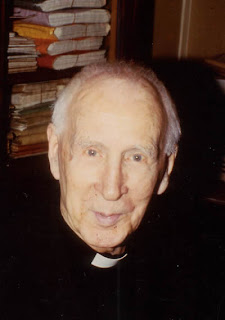Folks, my memory ain't what it used to be. Today's 1st reading about Abraham reminded me that I'd read something somewhere about Luther's objection to the prayer of the Mass concerning
the sacrifice of Abraham our father in faith. I'm 80% sure that it was in one of De Lubac's works, but I've flicked through my copies of
The Splendor of the Church, and
Catholicism but haven't found it. Can anyone point me in the right direction?
I'm usually pretty happy with Ignatius Press books, but this isn't the first time I've been inclined to curse them for not putting an index at the back of De Lubac's works.
Edited to add:Aha! It wasn't De Lubac at all. Idly opening Ratzinger's
Truth and Tolerance I found the following book-marked with a used metro ticket:
In the Roman Canon, in the First Eucharistic Prayer of the Missal as reformed by Pope Paul VI, the request is made to God that, with a gracious and tranquil countenance, he be pleased to look upon the offerings of the Church, as once he did upon the offering of his just servant Abel, upon the sacrifice of our Patriarch Abraham, and upon the holy sacrifice, a spotless victim, offered by the high priest Melchizedek. This petition called forth Luther's anger and was also strongly criticised in the circles of the Liturgical Movement as a misunderstanding of Christian worship, as the "regression" into Old Testament, pre-Christian attitudes. The early Church whose faith and prayer is expressed in this text, thought otherwise. For the early Church there was no clear break between the prayer of the nations, the prayer of Israel, and the prayer of the Church. Of course, the "novelty" of Christian worship and practice was a fundamental category of the Christian faith: the Lord has brought to pass something new, the new thing itself; but this new thing had been prepared for, and history, for all its confusion and errors, had been leading up to it. It was, of course, a matter of distinguishing between what led up to Christ and what was opposed to him. It was a matter of subjecting all this to a process of purification and renewal, but this would in fact mean, not destroying things and making an absolute break, but initiating renewal and healing. Faith makes its appearance in the history of religions as a crisis and the judgement, but not as a total condemnation of them.
The prayer "Supra quae", from which the quotations above are taken, is thus an introduction to the discernment of spirits, the interpretation, both critical and positive, of pre-Christian ways of worship. The choice of these figures is in many respects significant; Abel is the first martyr - someone who has not killed but let himself be killed and thus himself became a "lamb", anticipating the fate of Christ, the true Paschal Lamb. Abraham is ready to sacrifice Isaac his only son, and thus to give up his future, the meaning of the promise; the lamb, the ram, takes the place of the son - the light of Christ casts its rays ahead in multiple refractions. Melchizedek, the King of Salem, is priest of El Elyon - of "the most high God"; he offers bread and wine. This mysterious figure repeatedly drew the attention both the early Judaism and of the growing Church; the Letter to the Hebrews sees him as representing the priesthood of Jesus Christ as against the Aaronic priesthood.
[...]
Abraham is the forefather of Israel - our father, the Canon therefore says of him, drawing on Pauline theology. To become a Christian means entering into the history of faith that began with Abraham and, thus, accepting him as father. The sacrifice of Abraham referred to by the Roman Canon epitomises the transition from the "heathen" cult to the purified cult of Israel and, with the sacrifice of the lamb (which links Abraham with Abel), indicates the move towards the Christian cult, at the centre of which stands the Lamb who was sacrificed (Rev 5:6) - Christ, who gave himself to God on the night of suffering and to in his love reconciles us and draws us up to God. In that sense, the whole of the history of religion is referred to in this text, first leading up to Abraham (Israel) and, thereby, to Christ, and interpreted from his standpoint - from that of him who also offers us the standard by which to make the requisite distinctions, who is indeed himself that standard. (pp 95-98)
By the by, that part of the Roman Canon is, in my opinion, perhaps the most
evocative and
striking of the whole prayer, if one will concede the legitimacy of passing such judgements in these matters.
